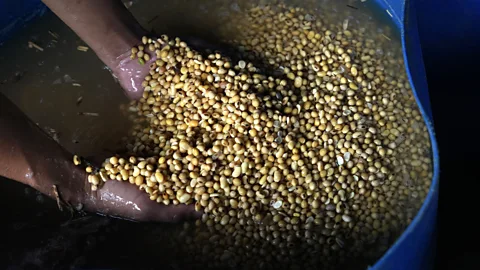How much protein do you really need to get strong?
 Serenity Strull/ BBC
Serenity Strull/ BBCFrom raw eggs to protein shakes, those hoping to expand their brawn are often encouraged to ingest vast quantities of protein. But how much is really necessary and what's the best way to consume it?
Sophia Moulson, 21, a fitness influencer based in West Sussex, began taking fitness seriously at the age of 19, after struggling with being overweight.
"I often turned to food as a source of comfort, which ultimately left me in a cycle of negative self-image and low confidence. One day, I realised that I needed to take control – not just for my physical health but for my mental wellbeing too," says Moulson.
Initially, she joined the gym with the sole intention of losing weight. But over time, she fell in love with the process of building up a healthy amount of muscle too. "I discovered how empowering it felt to grow stronger, and each small strength milestone motivated me to keep pushing forward," she says.
An integral part of Moulson's progress was research on nutrition. That's when she learned about the importance of protein for building muscle. However, as a vegetarian, Moulson initially felt that she was struggling to get enough protein through just her diet, so she turned to protein powders. "While it was possible for me to meet my needs through a well-balanced diet, it often required time and careful planning. Protein powders offered a convenient solution, especially with my busy lifestyle," she says.
Building the body
Linea Patel, a Sports Dietitian at the company Pure Sports Medicine in London, explains that proteins have many roles in the human body. As they are digested, the proteins in food are broken down into amino acids – building blocks that can be rearranged to form any protein that the body needs. Haemoglobin, enzymes, muscles, the keratin in our skin and hair – there are more than 20,000 proteins in the human body, performing a wide range of functions.
However, the amount that each person needs can vary greatly, depending on their age, body composition and lifestyle.
"In the UK, the government guidelines say that the general baseline for sedentary adults is that they should consume 0.8 or 0.75g [around 0.03oz] of protein per kg of their own body weight," says Patel. "So, for example, if somebody weighed 70kg [154lb], then you just multiply that by 0.8 and you'll get 56g [around 2oz] of protein a day."
Most people get more than that amount from their normal diets. In the US, the average American consumes around 14-16% of their total calories as protein. However, if you're more active, your protein requirements may exceed 1g per kg each day. The amount of protein you need also depends on factors such as your age, because people tend to lose muscle mass as they get older – consuming more protein can help us to hold onto more muscle. Post-menopausal women also have higher protein requirements.
"What I see in my clinical practice, particularly because I work with women in the menopause or high performing individuals [sportspeople], is that perhaps that they're not eating enough protein for their level of activity or to maintain [appropriate] muscle mass for their stage of life," says Patel. One size doesn't fit all, she explains.
 Getty Images
Getty ImagesDifferent requirements
For individuals engaging in regular high-intensity resistance training or athletes and powerlifters or body builders, research has found that the daily protein requirement is approximately 1.6-2.2g (0.06-0.08oz) per kg of body weight to maximise muscle protein synthesis.
Many medical professionals recommend that people acquire the protein they need from their diets, wherever possible. For vegans, this can involve consuming more nuts, seeds and soya-based products, as well as pulses such as beans and lentils. For vegetarians, eggs, yoghurt and certain types of cheese can be added, while omnivores may also want to increase their consumption of meat and seafood.
For many, consuming enough protein involves experimenting with different foods. However, not everyone has the time or money to acquire adequate protein through their diet alone.
"Even though, theoretically, one can meet this target through a balanced diet rich in protein-dense foods like lean meats, eggs, dairy and legumes, for many this may not be easy without supplementation," says Cyriac Abby Philips, a liver specialist at the Rajagiri Hospital in Kerala, India.
Lauren Manaker a dietician based in Charleston, South Carolina in the US, adds that protein powders "do provide a convenient and portable option, especially for individuals with busy lifestyles or limited access to whole food sources".
Globally, the protein powder market has been valued at $4.4bn (£3.6bn) in 2021, and is expected to grow to $19.3bn (£15.6bn) by 2030. There are many formulations – both animal and plant-based, in the form of shakes, or added to nutrition bars, yoghurts and ready meals.
"When I incorporated plant-based protein powders into my diet, it became much easier to hit my protein goals… Over time, I experimented with different options and found that lean protein powders or whey protein worked best for me, as they are low in calories but high in protein," says Moulson.
However, protein powders can come with risks, and there's some evidence in rats that they could lead to liver damage in those who are not exercising. There have also been rare cases of toxicity to the liver from whey and soy-based protein powders in humans.
Protein powders can also be misleadingly labelled and may contain harmful contaminants. For a recent study, Philips and colleagues from India and the US analysed protein powders sold in India. The team found that many powders contained more or less protein than they were marketed as having – leading to concerns about "protein-spiking" – as well as contaminants including heavy metals, fungal toxins and herbal extracts that may be toxic to the liver.
 Getty Images
Getty ImagesToxins in protein powders may be more widespread than we think.
In 2018, a nonprofit group called the Clean Label Project, based in Broomfield, Colorado, released a report about toxins in popular brands of protein powders in the US. Researchers screened 134 products for 130 types of toxins and found that many protein powders contained heavy metals (lead, arsenic, cadmium and mercury), bisphenol-A (or BPA, which is used to manufacture plastic), pesticides, or other contaminants with links to cancer and other health conditions. Some toxins were present in significant quantities.
For example, one protein powder contained 25 times the allowed limit of BPA in the US. The pesticides and chemicals came from agricultural residue and from the packaging of these powders, researchers observed. Interestingly, one certified "organic" product had twice the contaminants of non-certified ones. Plant-based protein powders were the most contaminated, while egg and whey-based powders were found to be the cleanest.
Because protein powders are considered dietary supplements and not pharmaceuticals, regulation from governing authorities tends to be more relaxed – in the US and the UK, they're considered food. This has led to concerns that they are not being regulated strictly enough.
A central protein
When increasing body muscle, it's not impossible to get your protein requirements through the foods you eat, but it can take considerable time and planning. The key to achieving your daily requirements is to eat protein at every meal and to plan your meals around a principal source of protein, says Patel.
"We're looking to aim for at least 20-30g (0.7-1.1oz) of protein per meal," says Patel. That would be the equivalent to a couple of eggs and some Greek yogurt with nuts sprinkled on top, or a chicken breast, or a piece of tofu that is the size of your fist.
"So, for example, you might have to have two eggs on sourdough toast with some avocado with some seeds sprinkled on top – with the eggs being the principal protein, the food source with the highest protein content," says Patel. "In a meal that consists of beans or lentils with some rice, the lentils would be the principal protein."
The protein powder route
If you decide to take a protein supplement instead or as well as altering your diet, there are a few simple rules for choosing one that is least likely to contain harmful substances. First of all, prioritise high-quality proteins with minimal additives, says Philips.
"One must definitely avoid 'blended' proteins with herbal components as the risk of adulteration, contamination inclusive of the presence of heavy metals and fungal toxins are higher in these types of protein supplements," he says.
Manaker also advises that consumers do their research, particularly to avoid unnecessary ingredients. "Look for protein powders that contain high-quality ingredients and have minimal additives, fillers or artificial sweeteners. Opt for brands that prioritise transparency and provide detailed information about the sourcing and processing of their ingredients," Manaker says.
 Getty Images
Getty ImagesManaker also recommends considering the source of the protein in the powder. It's important to check labels to see if it's from whey, casein, soya, plant or animal-based proteins, she says. "Choose a protein source that aligns with your dietary preferences, allergies or sensitivities."
If you're taking a protein supplement or powder, timing can play a role in optimising its benefits, says Manaker. "Consuming protein within 30 minutes to an hour after a workout is often recommended to take advantage of the body's heightened ability to absorb and utilise nutrients during this time," she says.
And the way you take protein powders matters. While protein supplements can be beneficial, it's crucial to avoid relying solely on them as a source of nutrition. "Whole, nutrient-dense foods should form the foundation of your diet, and supplements should only complement a well-balanced eating plan. Avoid the temptation to replace meals entirely with protein powders, as this can lead to an inadequate intake of other essential nutrients," says Manaker.
Beware of too much protein
With widespread access to protein powders and protein-rich foods today, some people do consume more protein than what they probably need, says Manaker. For example, while the average adult needs around 45-56 grams (1.6-2 ounces) of protein per day, in the UK people tend to consume around 75-100 grams (2.6-3.5 ounces). While it is essential for muscle building and overall health, consuming an excessive amount of protein intake can have potential risks.
"High protein intake over a prolonged period can put strain on the kidneys," says Manaker. "Individuals with pre-existing kidney conditions should be particularly cautious."
Furthermore, a sudden increase in protein intake, especially from protein powders, can sometimes lead to digestive discomfort such as bloating, gas and constipation. "Keep an eye on the way your body reacts, even as you tweak your protein [intake]," says Patel.
Keep in mind that it's easy to go overboard with protein powders. "As a general guideline, I wouldn't recommend that people using protein powders exceed 80g [2.8oz] a day," says Patel. "Even 80g of protein from protein powder is excessive for most people. It's going to completely displace whole foods that provide vitamins, minerals and other nutrients that we need. So in general, for most of my clients I tell them to stick with 20 to 40g [0.7-1.4oz] of protein powder per day."
In particular, problems tend to arise when one's diet is laser-focused only on proteins, says Patel. Micronutrients from fruit, vegetables and carbohydrates, which are also vital for a balanced diet, can end up being neglected.
In order to optimise your diet while weight training, ensure that you're including quality carbohydrates and prioritise micro-nutrients like Vitamin D, magnesium, iron and Omega 3 fats. "They're all essential for optimum muscle contraction, bone health and energy. Eat fruits, vegetables and include oily fish in your diet at least once a week," says Patel.
Getting enough protein is key to growing stronger muscles, but it's only one of the pillars of wellness, says Patel. "The other pillars are physical activity, getting the training right and sleeping well," she says.
* An earlier version of this article stated that two eggs or some greek yoghurt and nuts would provide sufficient protein for a meal. Eggs contain around 8g of protein each, so this should have read, two eggs and greek yoghurt. It was updated on 8 April 2025.
--
For trusted insights into better health and wellbeing rooted in science, sign up to the Health Fix newsletter, while The Essential List delivers a handpicked selection of features and insights.
